Navigating skincare during menopause can be a remarkable journey to ageless beauty. In this blog, we'll look at some expert recommendations to help you keep your skin glowing and healthy during this time.
The Impact of Menopause on Skin: Understanding the Changes
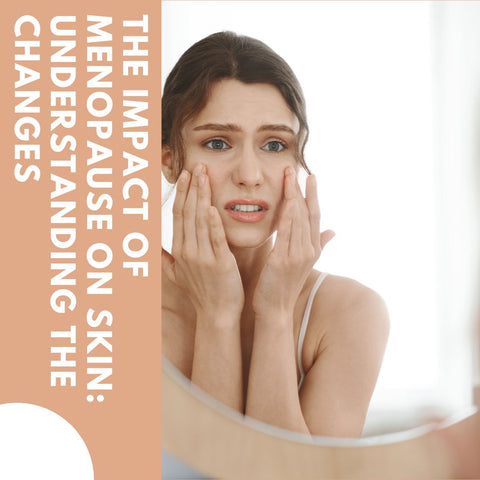
Menopause can have a substantial impact on the skin, causing a variety of changes to its look, texture, and overall health. Understanding these changes is vital for creating a menopausal-specific skincare routine. Menopause's usual effects on the skin include oestrogen loss, dryness and dehydration, loss of firmness and elasticity, increased sensitivity, hyperpigmentation and uneven skin tone, acne and outbreaks, and slower wound healing. Menopausal women can nourish their skin, minimise ageing indications, and keep a young complexion for years by combining targeted components such as moisturising moisturisers, collagen-boosting peptides, and skin-brightening agents.
Hormonal Havoc: How Menopause Affects Your Skin's Health
Hormonal Havoc: How Menopause Affects Your Skin's Health examines the complex relationship between menopause and skin changes, shedding light on the hormonal fluctuations that can affect skin health. Here is an investigation into the effects of menopause on the skin:
-
Menopause causes a significant decrease in estrogen levels, which are critical in maintaining skin elasticity, moisture, and thickness. The decrease in oestrogen causes a variety of skin changes, such as dryness, thinning, and loss of firmness.
-
Reduced estrogen levels cause a decrease in oil production, resulting in drier skin that is more susceptible to dehydration. Menopausal women may experience flakiness, rough texture, and a sense of tightness as a result of poor moisture retention.
-
Estrogen deficiency can weaken collagen and elastin fibres in the skin, resulting in loss of elasticity and firmness. As a result, menopausal women may experience sagging skin, fine lines, and wrinkles, especially around the eyes, mouth, and neck.
-
Hormonal fluctuations during menopause can cause an increase in melanin production, resulting in the appearance of dark spots, patches, and uneven skin tone. Sun exposure can exacerbate this condition, known as hyperpigmentation, and targeted treatment may be required to fade discoloration.
-
While some women experience dryness and thinning of their skin during menopause, others may develop acne or have more breakouts. Hormonal imbalances can cause excess sebum production and clogged pores, resulting in acne flare-ups, particularly along the jawline, chin, and cheeks.
-
Menopausal skin may become more sensitive and prone to irritation due to hormonal fluctuations and a weakened skin barrier. Environmental factors such as UV radiation, pollution, and harsh skincare products can exacerbate sensitivity, leading to redness, itching, and inflammation.
-
Estrogen is known to promote wound healing and tissue regeneration in the skin. As estrogen levels decline during menopause, the skin's ability to repair itself may be compromised, leading to slower wound healing and a greater susceptibility to skin injuries.
Collagen and Elasticity: Battling the Signs of Aging
As we age, maintaining collagen and elasticity becomes increasingly important for preventing obvious indications of ageing and promoting youthful-looking skin. Here's how to combat the signs of ageing by focusing on collagen and elasticity using collagen-boosting chemicals, hydrating and moisturising, UV protection, frequent exfoliation, healthy lifestyle choices, topical treatments and procedures, and maintaining a consistent skincare routine. By emphasising collagen and elasticity in your skincare routine and lifestyle, you may effectively counteract the signs of ageing and obtain a smoother, firmer, and more radiant face. Be patient and consistent in your efforts, and remember that healthy skin reflects general well-being.
Sensitive Skin Solutions: Adapting Your Skincare for Menopause
To alleviate discomfort and promote skin health, incorporate gentle, soothing, and hydrating products into your skincare routine. Here are some solutions designed specifically for sensitive skin during menopause:
-
Gentle Cleansing: Use a gentle, non-irritating cleanser that contains no harsh ingredients like sulphates, fragrances, or alcohol. Choose creamy or oil-based cleansers that gently remove impurities while preserving the skin's natural oils.
-
Hydrating Ingredients: Look for skincare products that include hydrating ingredients like hyaluronic acid, glycerin, and ceramides. These ingredients replenish moisture, strengthen the skin barrier, and soothe irritation, bringing relief to sensitive, menopausal skin.
-
Avoid Harsh Exfoliation: Avoid using abrasive exfoliants and physical scrubs, as they can exacerbate sensitivity and irritation. Instead, use gentle exfoliants like alpha hydroxy acids (AHAs) or beta hydroxy acids (BHAs) to remove dead skin cells and promote cell turnover without causing inflammation.
-
Calming Ingredients: Use skincare products that contain calming and anti-inflammatory ingredients like aloe vera, chamomile, green tea extract, and oat extract. These ingredients help menopausal women with sensitive skin by reducing redness, soothing irritation, and restoring skin comfort.
-
Patch Test New Products: Before incorporating new skincare products into your routine, perform a patch test to rule out any adverse reactions or sensitivity. Before using the product, apply a small amount to a discreet area of skin and wait 24-48 hours to see if there is any irritation or allergic reaction.
-
Sun Protection: Apply broad-spectrum sunscreen with an SPF of 30 or higher to your skin daily to protect it from the sun's harmful UV rays. To avoid sunburn and additional skin damage, use sunscreen formulas specifically designed for sensitive skin and reapply every two hours when outdoors.
-
Cooling Treatments: Cooling skincare products like facial mists, gel moisturisers, or sheet masks to soothe and refresh sensitive menopausal skin. Keep these products in the refrigerator for an extra cooling effect, providing instant relief from heat and discomfort.
-
Consult a Dermatologist: If you are experiencing persistent sensitivity or skin issues during menopause, see a dermatologist for personalised advice and treatment options. They can assist in identifying underlying causes of sensitivity and providing tailored solutions to address your specific concerns.
By incorporating these sensitive skin solutions designed for menopause into your skincare routine, you can effectively manage sensitivity, soothe irritation, and maintain skin health during this life transition. Choose gentle, hydrating, and calming products to keep your skin comfortable and radiant throughout menopause and beyond.
Essential Skin Care Tips for the Menopausal Years
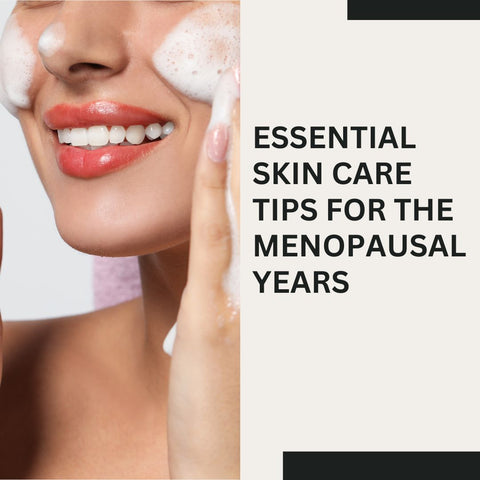
Navigating skincare during the menopausal years necessitates a personalised approach that addresses the unique changes that occur in the skin during this stage of life. Here are some essential skincare tips for menopausal women to keep their skin healthy and radiant:
-
Hydrate Inside and Out: Hormonal changes cause menopausal skin to become drier. Drink plenty of water to stay hydrated from the inside, and use hydrating skincare products like moisturisers, serums, and facial oils to replenish moisture and improve skin barrier function.
-
Protect against Sun Damage: Hormonal changes can make the skin more vulnerable to sun damage and premature ageing. Apply broad-spectrum sunscreen with an SPF of 30 or higher daily, and reapply every two hours when outdoors. Wear protective clothing, hats, and sunglasses to reduce UV exposure.
-
Focus on Gentle Cleansing: Use gentle, non-foaming cleansers that will not strip the skin of its natural oils. Avoid harsh ingredients like sulphates and alcohol, which can dry out the skin and aggravate sensitivity. Cleanse your skin in the morning and evening to remove impurities and avoid clogged pores.
-
Address Hormonal Acne: Some menopausal women may develop acne or breakouts as a result of hormonal fluctuations. To prevent blemishes and target acne-causing bacteria, use skincare products that contain salicylic acid or benzoyl peroxide. Avoid heavy, pore-clogging products and instead use oil-free or non-comedogenic formulas.
-
Boost Collagen Production: During menopause, collagen depletion occurs, resulting in skin firmness and elasticity loss. Incorporate collagen-boosting ingredients like retinoids, peptides, vitamin C, and niacinamide into your skincare routine to boost collagen production and improve skin texture.
-
Combat Hyperpigmentation: Hormonal changes can cause an increase in melanin production, resulting in dark spots, patches, and uneven skin tone. To brighten the skin and fade discoloration, use skincare products that contain vitamin C, niacinamide, licorice extract, or kojic acid.
-
Regular Exfoliation: To improve skin texture, encourage cell turnover, and get rid of dead skin cells, exfoliate your skin regularly. Select mild exfoliants that dissolve dead skin cells without irritating the skin, like beta hydroxy acids (BHAs) or alpha hydroxy acids (AHAs). To prevent over-exfoliating, limit your weekly exfoliation to two to three times.
-
Prioritise Skin Barrier Repair: Sensitivity and moisture loss may increase in menopausal skin due to a compromised skin barrier. To strengthen and repair the skin barrier and restore its natural protective function, use skincare products that contain cholesterol, fatty acids, and ceramides.
-
Control Your Stress: Stress can hasten the ageing process and aggravate skin conditions. Meditation, yoga, deep breathing exercises, or hobbies that you enjoy can all help to promote overall well-being and maintain healthy skin.
-
Consult a Dermatologist: If you are experiencing persistent skin issues or changes during menopause, see a dermatologist for personalised advice and treatment options. They can assist you in addressing specific skin issues and providing solutions that are tailored to your needs.
By following these essential skincare tips, menopausal women can effectively manage changes in their skin and maintain a healthy, radiant complexion throughout this transformative phase of life. Tailor your skincare routine to your specific concerns, and gracefully embrace the beauty of ageing.
Hydration Heroes: Moisturizing Strategies for Mature Skin
Maintaining moisture is critical for aged skin because it supports its natural barrier function and creates a plump, youthful appearance. Some "hydration heroes" and moisturising tactics specifically targeted for mature skin are rich moisturizers, hydrating serums, face oils, humectants, barrier repair creams, nightly masks, hydration from inside, and humidifiers. By adding these hydration heroes and moisturising tactics into your skincare routine, you may effectively nourish and hydrate elderly skin, resulting in a plump, bright complexion that defies the signs of age. Customise your skincare programme to meet your specific skin demands and reap the transforming advantages of moisturised, youthful-looking skin.
Sun Safety: Shielding Aging Skin from UV Damage
Protecting ageing skin from UV exposure is critical for keeping it healthy and avoiding premature ageing. Some sun safety suggestions for ageing skin include using broad-spectrum sunscreen liberally, seeking shade, wearing protective clothing, avoiding tanning beds, staying hydrated, getting frequent skin checks, and using antioxidants. By implementing these sun safety guidelines into your daily routine, you may help protect ageing skin from UV damage, lower your risk of skin cancer, and keep a healthy, youthful complexion for many years to come. Prioritise sun protection as part of your skincare routine to reap the benefits of protected, beautiful skin at any age.
Nightly Nourishment: Optimizing Your Evening Skincare Routine
Optimising your bedtime skincare routine is critical for mending and renewing your skin as you sleep. Here's how to maximise your nightly nourishment for healthy, glowing skin: double wash, exfoliate, use a hydrating toner, target treatments, eye cream, moisturise, seal in with oil, apply an overnight mask or treatment, care for your lips, and sleep on clean pillowcases. By following these nighttime nourishing guidelines and personalising your evening skincare routine to your skin's individual needs, you can improve skin health, repair damage, and wake up with a radiant complexion every morning. Consistency is essential, so stick to your skincare routine and experience the transforming effects of nighttime nourishment for healthy, bright skin.
Beyond Basics: Advanced Skincare Strategies for Menopause
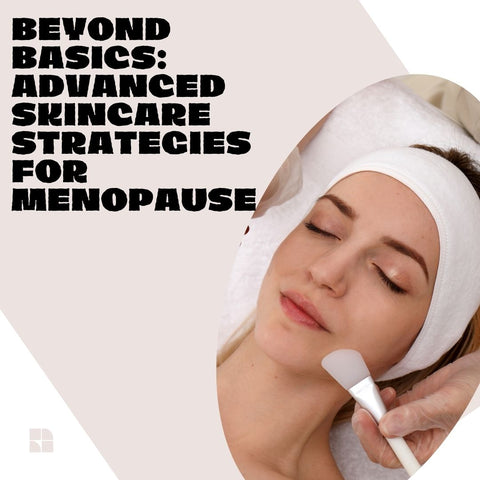
Menopause causes significant changes in hormone levels and skin health, so advanced skincare strategies are necessary to manage specific concerns while also promoting overall skin health. Here are some advanced skincare strategies specifically designed for menopause:
-
Consult a healthcare provider about hormone replacement therapy (HRT) for menopausal symptoms and skin health. Estrogen therapy can help address skin dryness, thinning, and loss of elasticity associated with declining hormone levels.
-
Incorporate prescription-strength retinoids, such as tretinoin or adapalene, into your skincare regimen to reduce fine lines, wrinkles, and uneven skin tone caused by ageing and hormonal changes. Retinoids stimulate collagen production, increase cell turnover, and improve skin texture.
-
Consider professional skincare treatments like microneedling, chemical peels, laser therapy, or radiofrequency to address specific issues like wrinkles, hyperpigmentation, and skin laxity. These treatments can increase collagen production, improve skin tone and texture, and promote overall skin rejuvenation.
-
Consider topical hormone therapy options such as oestrogen creams or gels to deliver hormones directly to the skin and alleviate symptoms of oestrogen deficiency such as dryness, thinning, and loss of elasticity. Consult with a dermatologist to determine the best topical hormone treatment for your skin needs.
-
To address specific menopausal skin concerns, use targeted serums and ampoules with high concentrations of active ingredients like peptides, growth factors, antioxidants, and hyaluronic acid. These potent formulations can provide intense hydration, promote collagen production, and increase skin firmness and elasticity.
-
Consider taking oral supplements that contain collagen peptides, vitamins, minerals, and antioxidants to promote skin health from the inside. Collagen supplements, vitamin C, vitamin E, omega-3 fatty acids, and coenzyme Q10 can all help to improve skin elasticity, hydration, and anti-aging properties.
-
To manage stress and reduce the impact of stress hormones on skin health, try stress-reduction techniques like meditation, yoga, deep breathing exercises, or mindfulness. Chronic stress can exacerbate skin problems and speed up the ageing process, so stress management is critical for overall skin health.
-
Schedule regular visits to a dermatologist for comprehensive skin evaluations, personalized treatment recommendations, and ongoing management of skin concerns associated with menopause. A dermatologist can provide advanced skincare solutions, monitor changes in your skin over time, and adjust treatment plans as needed to optimize skin health and vitality.
By incorporating these advanced skincare strategies into your menopausal skincare routine, you can effectively address specific concerns, promote skin health, and achieve a radiant, youthful complexion that defies the effects of ageing. Consult with skincare professionals and healthcare providers to create a comprehensive skincare plan that is tailored to your specific needs and goals during this life-changing phase.
Tackling Menopausal Acne: Targeted Treatments and Tips
Menopausal acne can be difficult to treat due to hormonal shifts and skin health changes. Here are focused therapies and strategies to properly treat menopausal acne, including gentle washing, topical retinoids, salicylic acid, benzoyl peroxide, hormone therapy, anti-inflammatory skincare, hydration, sun protection, stress management, and expert treatment choices. Incorporating these focused treatments and advice into your skincare routine will help you control menopausal acne and achieve cleaner, healthier skin. Be patient and consistent with your skincare routine, and consult a dermatologist or skincare specialist for personalised suggestions and treatment choices based on your skin conditions.
The Power of Antioxidants: Fighting Free Radicals for Firmer Skin
Antioxidants play an important role in skincare by neutralising free radicals, which can harm skin cells and contribute to premature ageing. Including antioxidants in your skincare regimen can help maintain firmer, more youthful-looking skin, encourage the production of collagen, and fight oxidative stress. This is the mechanism of action of antioxidants and how to use them to firmer skin:
-
Unstable molecules called free radicals can oxidatively damage skin cells, resulting in the deterioration of collagen, fine lines, wrinkles, and sagging skin. By giving electrons to free radicals, antioxidants help neutralise them and stop them from doing more harm to the skin.
-
It has been demonstrated that antioxidants like ferulic acid, vitamin C, and vitamin E increase the production of collagen in the skin. The protein collagen helps to keep the skin firm, elastic, and resilient by giving it support and structure.
-
Antioxidants can aid in shielding the skin from UV radiation's damaging effects, such as sunburn, early ageing, and a higher chance of developing skin cancer. They function by eliminating oxidative stress in the skin and scavenging free radicals produced by UV exposure.
-
Antioxidants with skin-brightening qualities, like vitamin C and niacinamide, can help reduce the appearance of dark spots, hyperpigmentation, and uneven skin tone. By inhibiting melanin production and promoting cell turnover, antioxidants can reveal a more radiant and even complexion.
-
Antioxidants with anti-inflammatory properties, such as green tea extract and resveratrol, can help calm redness, irritation, and inflammation in the skin. By reducing inflammation, antioxidants can alleviate symptoms of conditions such as rosacea, acne, and eczema.
-
Antioxidants help strengthen the skin's natural barrier function by protecting against environmental aggressors and reinforcing lipid layers. A stronger skin barrier helps retain moisture, prevent dehydration, and improve overall skin health and resilience.
-
Common antioxidants used in skincare include vitamin C (ascorbic acid), vitamin E (tocopherol), niacinamide (vitamin B3), green tea extract, resveratrol, coenzyme Q10, and ferulic acid. Each antioxidant offers unique benefits and can be used alone or in combination with other antioxidants for enhanced efficacy.
-
Include antioxidant-rich products such as serums, moisturizers, and treatments in your skincare routine to reap the benefits of these powerful ingredients. Apply antioxidants in the morning to protect against environmental damage and in the evening to support skin repair and regeneration.
Wrinkle Reduction: Techniques to Smooth Mature Skin
A mix of skincare practices and lifestyle choices is needed to minimise the appearance of fine lines and wrinkles, increase skin elasticity, and promote collagen production to reduce wrinkles and smooth out mature skin. The following methods can be used to lessen ageing signs and smooth out mature skin:
-
Retinoids: To promote collagen production, accelerate cell turnover, and enhance skin texture, include retinoids in your skincare regimen. Examples of retinoids include retinol and prescription-strength tretinoin. Over time, retinoid therapy is beneficial in mitigating the visibility of wrinkles, fine lines, and uneven skin tone.
-
Peptides: Search for skincare products that contain peptides, which are chains of amino acids that aid in the stimulation of collagen synthesis and the promotion of firmer, smoother skin. Peptides aid in the skin's natural repair mechanisms, which can help lessen the severity and visibility of wrinkles.
-
Hyaluronic Acid: Hyaluronic acid is a humectant that draws and holds moisture in the skin, hydrating and plumping the skin. For a more youthful appearance, hyaluronic acid helps moisturise the skin, reduce fine lines, and restore elasticity.
-
Vitamin C: Include vitamin C in your skincare regimen to brighten your skin, promote the formation of collagen, and shield it from oxidative damage. Vitamin C serums promote a more even skin tone and help minimise the appearance of fine lines and wrinkles.
-
Antioxidants: To combat free radicals, shield the skin from environmental damage, and stop premature ageing, use skincare products high in antioxidants. Antioxidants that support the skin's natural repair mechanisms and preserve skin health include resveratrol, vitamin E, and green tea extract.
-
Sun Protection: Use a broad-spectrum sunscreen with an SPF of 30 or higher every day to shield your skin from the sun's damaging UV rays. Sunscreen aids in the prevention of sunspots, fine lines, wrinkles, and photoaging of collagen.
-
Topical Treatments: To exfoliate the skin, enhance its texture, and encourage cell turnover, think about applying topical treatments like growth factors, beta hydroxy acids, or alpha hydroxy acids (AHAs). These procedures can lessen the visibility of wrinkles, smooth out rough skin, and improve the overall brightness of the skin.
-
Moisturization: To stop moisture loss and preserve the integrity of your skin barrier, use moisturisers that contain emollients, humectants, and occlusives. This will keep your skin nourished and hydrated. Glycerin, squalane, and ceramides are examples of moisturising ingredients that help plump up the skin and minimise the look of wrinkles and fine lines.
-
Dermatological Procedures: To treat deeper wrinkles and ageing indicators, consider dermatological procedures like chemical peels, microdermabrasion, laser therapy, microneedling, or injectable fillers. These operations can further improve the firmness and texture of the skin while producing more striking results.
-
Healthy Lifestyle Practices: To promote general skin health and vitality, adopt healthy lifestyle practices including eating a balanced diet, drinking plenty of water, getting enough sleep, exercising frequently, and managing stress. Maintaining a healthy lifestyle can help reduce the signs of ageing on the skin and make the appearance more youthful.
By incorporating these techniques into your skincare routine and lifestyle, you can effectively smooth mature skin, reduce wrinkles, and achieve a more youthful and radiant complexion. Be patient and consistent with your skincare routine, and consult a dermatologist for personalised recommendations and treatment options based on your specific skin concerns.
Personalizing Your Post-Menopause Skincare Routine
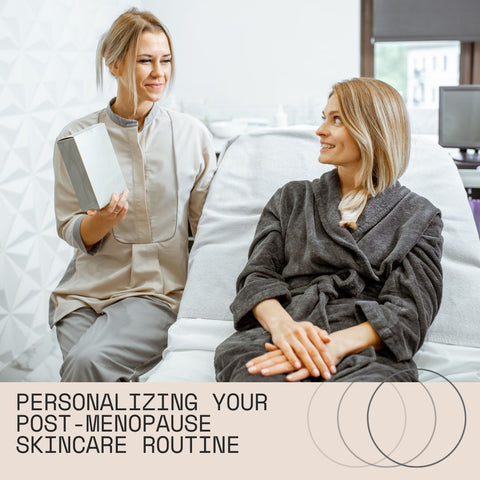
Personalising your post-menopause skincare routine is critical for addressing specific skin concerns and maintaining skin health during this transformative time in life. Here's how to customise your skincare routine to meet the specific requirements of post-menopausal skin:
-
Assess Your Skin: Begin by evaluating your skin's current state, including any changes in texture, tone, elasticity, and hydration. Identify specific skincare concerns to address, such as dryness, wrinkles, age spots, or loss of firmness.
-
Hydration is Key: Post-menopausal skin tends to become drier due to hormonal changes, so prioritize hydration in your skincare routine. Hydrating cleansers, moisturisers, serums, and masks with ingredients such as hyaluronic acid, glycerin, and ceramides can help replenish moisture and improve skin barrier function.
-
Targeted Treatments: Targeted treatments such as retinoids, peptides, growth factors, and antioxidants can help with specific indications of ageing such as fine lines, wrinkles, loss of elasticity, and uneven skin tone. Choose products that include potent active ingredients to boost collagen formation, increase cell turnover, and protect against oxidative damage.
-
Sun Protection: Protect your skin from the sun's harmful UV rays by using a broad-spectrum sunscreen with an SPF of 30 or higher every day. Look for sunscreens designed exclusively for mature skin, which may have additional anti-aging ingredients like antioxidants, peptides, or moisturising agents.
-
Gentle Exfoliation: Incorporate moderate exfoliation into your skincare routine to eliminate dead skin cells, improve skin texture, and increase product penetration. Choose exfoliants like alpha hydroxy acids (AHAs) or beta hydroxy acids (BHAs) that exfoliate softly and do not cause irritation or inflammation.
-
Eye and Lip Care: Pay careful attention to the delicate skin around the eyes and lips, which can reveal signs of ageing more clearly. To lessen the appearance of fine lines, wrinkles, and dark circles, use targeted eye creams and lip treatments formulated with moisturising and anti-aging components.
-
Consult a Dermatologist: If you have specific skin issues or conditions, such as rosacea, eczema, or hormonal acne, speak with a dermatologist about personalised suggestions and treatment choices. A dermatologist can evaluate your skin's needs and recommend customised remedies to address your specific difficulties.
-
Consistency is Key: Be consistent with your skincare routine and allow items to work before expecting results. Maintain a routine that works for your skin type and issues, and make adjustments as needed as your skin changes over time.
-
Healthy Lifestyle Habits: Maintain good lifestyle habits such as eating a well-balanced diet, staying hydrated, getting enough sleep, exercising regularly, and managing stress to promote overall skin health. A healthy lifestyle can supplement your skincare regimen and improve the effectiveness of your skincare products.
-
Listen to Your Skin: Pay attention to how your skin reacts to various creams and substances, and then adapt your routine accordingly. If you develop discomfort, sensitivity, or other bad effects, stop using the product and look into other options.
By tailoring your post-menopause skincare routine to your skin's individual needs and issues, you can effectively combat ageing, maintain skin health, and attain a bright, young complexion at any age. When caring for your skin, be patient, consistent, and proactive, and seek help and support from skincare professionals as needed.
Vitamins and Supplements: Boosting Skin Health from Within
Using vitamins and supplements to improve skin health from within can supplement your skincare routine and promote a glowing complexion. Here are some key vitamins and supplements that are known to nourish the skin:
-
Vitamin C: As a potent antioxidant, vitamin C protects the skin from oxidative stress caused by free radicals and environmental pollutants. It also promotes collagen synthesis, brightens the skin, and minimises the appearance of dark spots and hyperpigmentation.
-
Vitamin E: Another powerful antioxidant, vitamin E protects the skin from UV rays and environmental aggressors, promoting skin repair and regeneration. It also improves skin hydration and strengthens the natural barrier function.
-
Vitamin D: Vitamin D is essential for skin health because it boosts immune function, reduces inflammation, and promotes healing. Adequate vitamin D levels are critical for maintaining healthy skin and avoiding conditions like eczema and psoriasis.
-
Vitamin A: Also referred to as retinol or retinoids, vitamin A derivatives aid in enhancing skin texture, reducing the visibility of fine lines and wrinkles, and stimulating the production of collagen. Additionally, they control the production of oil and encourage cell turnover, which results in skin that looks smoother and younger.
-
Omega-3 Fatty Acids: Found in fish oil supplements, omega-3 fatty acids support overall skin health, help keep skin hydrated, and lower inflammation. They can aid in reducing the signs and symptoms of inflammatory skin diseases like psoriasis and eczema.
-
Collagen Supplements: Collagen is a protein that gives the skin elasticity and structure, keeping it smooth and firm. Supplemental collagen may help the skin produce more collagen, lessen wrinkles, and increase skin suppleness.
-
Hyaluronic Acid: The skin naturally contains hyaluronic acid, which aids in moisture retention and plumping the skin. By hydrating the skin from the inside out, hyaluronic acid supplements may help minimise the visibility of wrinkles and fine lines.
-
Zinc: Zinc is a necessary mineral that helps maintain the health of the skin by controlling the production of oil, lowering inflammation, and encouraging the healing of wounds. Supplemental zinc may support general skin function and help reduce the symptoms of acne.
-
Probiotics: By fostering a balanced gut microbiota, probiotics, which are good bacteria that enhance gut health, may also have an indirect positive impact on skin health. Probiotic supplements may help relieve inflammatory skin conditions like eczema and acne, according to some studies.
-
Antioxidant-Rich Foods: To promote skin health from the inside out, include antioxidant-rich foods in your diet in addition to supplements. Incorporate vitamin A, C, and E-rich fruits, vegetables, nuts, seeds, and whole grains; also include antioxidants like flavonoids, lycopene, and beta-carotene.
Natural and Holistic Approaches: Gentle Care for Aging Skin
Natural and holistic approaches to ageing skin offer delicate care, focusing on nourishing the skin from within while employing mild, non-toxic products on the outside. Here are some holistic treatments and natural solutions to assist the ageing skin:
-
Healthy Diet: Eat a diet high in whole foods such as fruits, vegetables, lean protein, healthy fats, and whole grains. Consume antioxidant-rich foods like berries, leafy greens, nuts, and seeds to improve skin health and protect against oxidative stress.
-
Hydration: Drink plenty of water all day to keep your skin hydrated from within. Herbal teas and coconut water are also hydrating options with additional skin-nourishing properties.
-
Natural Skincare Ingredients: Select skincare products formulated with natural, plant-based ingredients that are gentle on ageing skin. Look for botanical extracts, herbal infusions, plant oils, and essential oils that are known to nourish, soothe, and prevent ageing.
-
Gentle Cleansing: Remove dirt, impurities, and makeup with mild, non-foaming cleansers or oil cleansers that do not strip the skin of its natural oils. Avoid using harsh cleansers and exfoliants, which can irritate ageing skin and disrupt the skin barrier.
-
Moisturization: Natural moisturisers like jojoba oil, argan oil, rosehip seed oil, shea butter, cocoa butter, and aloe vera gel can help hydrate ageing skin. These ingredients moisturise, nourish, and protect mature skin without clogging pores or causing irritation.
-
Facial Massage: Use facial massage techniques to increase blood circulation, lymphatic drainage, and improve skin tone and texture. To relax facial muscles and reduce tension lines, make gentle upward strokes with your fingertips or a facial roller.
-
DIY Face Masks: Use natural ingredients like honey, yoghurt, avocado, oatmeal, and turmeric to nourish, hydrate, and rejuvenate ageing skin. Experiment with various ingredients to see what combinations work best for your skin type and concerns.
-
Sun Protection: To protect your skin from the sun's harmful UV rays, wear hats, sunglasses, and protective clothing when outside, and use mineral-based sunscreens containing zinc oxide or titanium dioxide. Avoid excessive sun exposure, especially during peak hours, and seek shade whenever possible.
-
Stress Reduction: Relaxation techniques like meditation, deep breathing exercises, yoga, or tai chi can help you manage your stress. Chronic stress can cause premature ageing and worsen skin conditions, so prioritise self-care and stress management techniques.
-
Quality Sleep: Get enough restful sleep every night to allow your skin to heal and regenerate. Aim for 7-9 hours of quality sleep and create a bedtime routine that promotes relaxation and restful sleep.
By adopting natural and holistic skincare practices, you can gently care for ageing skin while also supporting overall health and well-being. Listen to your skin's needs, nourish it with healthy ingredients, and prioritise self-care practices that promote balance and harmony to achieve a radiant complexion at any age.
Embracing Ageless Beauty: Tailoring Skincare to Your Menopausal Journey
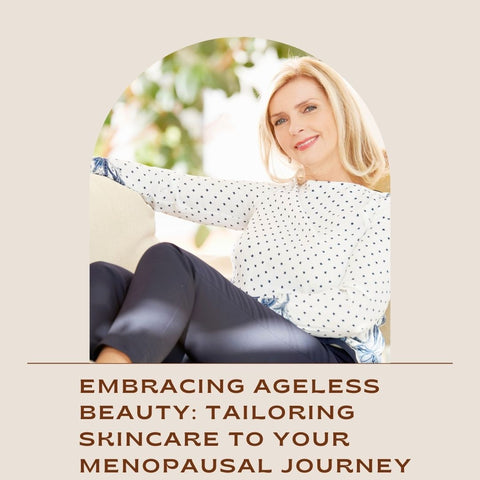
Embracing ageless beauty during the menopausal transition entails customising skincare to meet the unique needs and challenges of mature skin. Here's how to develop a skincare routine that celebrates and enhances your natural beauty during this transformative stage of life: assess your skin, prioritise hydration, target specific concerns, sun protection, boost collagen production, gentle exfoliation, eye and lip care, healthy lifestyle habits, consult a skin care professional, and embrace self-care. By customising your skincare routine for your menopausal stage and embracing ageless beauty, you can achieve healthy, radiant skin that reflects your natural vitality and inner confidence. Celebrate the wisdom, strength, and beauty of this transformative stage of life, and view skincare as a form of self-care and empowerment that recognises and enhances your unique beauty at any age.
































